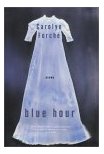|
Contents » Cover |
||
|
Reviews
Carolyn Forche's latest collection of poems, The Blue Hour, is an achingly haunting, furious reflection on life and loss, in a language which recalls her work in editing Against Forgetting: Twentieth Century Poetry of Witness. The number of poems is small; nine poems in which she evokes the broken relationship we have with life set against the longer fifty pages of "On Earth" in which she explores the movements of thought at death. In the first poems, she arranges dense, sonorous recollections of a lived world in not quite closed images and syntax so that one remembers the tentative hold and wanting that life is. Like the prose of Sebold or the poetry of Celan, this is language that cannot forget the violences of the twentieth century, that deliberately breaks language so that it tells the moral facts of being in such a world. It is poetry of fantastic images (from "The Blue Hours)":
The moon slips from its cerement, and my son, already disappearing into a man, moves towards his bed for the night, wrapped in a towel of lake scent. And submerged relations:
Ash over conifers and birches, over berry thickets. Resembling snow and its synonyms. Silvered fields of millet. Forche sets "On Earth" against this elegaic music, painting the unravelling of our hopes at immortality by arranging the movement of a dying person's thoughts in an abecedary—a poem in which the lines are arranged in dictionary order—so that even as one adheres to that order, life unravels, and language breaks. This is poetry at its finest, levering open the hold we essay in post-Enlightenment language, so that we cannot hide in language from life, so that caring, with all its fine beauty and loss, breaks through.
|
|||||
